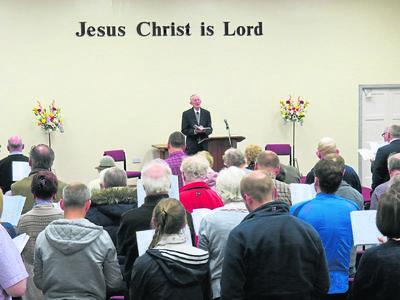
What is new or unexpected in the order of worship is distracting. Good changes should be made, if necessary, and then stick with them. Of course, worship should include different hymns, different prayers, and a different sermon each week; but the sequence of elements should be relatively constant. When the order of worship changes too frequently, the worshipper is wondering what’s coming next, not worshipping. A church should have a sound order of worship and generally stick to it, then those who worship there can become accustomed to it and actually worship using it.
Worshipping the same way over many years ties generations of worshippers together. Some may defend changes in the worship order as raising the interest level. In an important sense worship services should not be interesting. They should be transparent to what is of real interest, God himself. An ‘interesting’ worship service is like a dirty window, it gets in the way of seeing what you want to see.
Focusing attention on God, meditating on his presence, his attributes, his majesty and his love, his power, glory, goodness, faithfulness, etc. takes some effort. Thinking about the transcendent one does not come naturally or easily to most of us. We are of the earth, and our spirits find it hard to soar. We need all the help we can get, not thoughtless distractions. Hand shakes, applause, announcements, jokes, introductions, interviews, pleas for money and the like distract us from the hard and necessary work of worship.
Three concerns
This understanding of proper worship raises three important concerns.
First, some may argue that all of this sounds as if it is against fellowship. If there is little fellowship during worship services, does not that eliminate an important part of the body life of the church?
Fellowship is important to the life and ministry of the church, but it is not the primary purpose of public worship. We worship as a community of believers. Certainly we are aware of one another as we worship. We sing together, pray together, profess together, give together, listen together. But these actions are not mixers intended to help us socialize. They are directed to God, and we do them as one. A congregation at worship is like a choir in concert. Certainly choir members are aware of one another, but their purpose in joining together is a common musical effort for the audience. So the purpose of a congregation at worship is not to socialize, but a communal worship of the Lord.
Other church events intentionally encourage fellowship, events such as Bible studies, or even picnics!

A second concern is that such focused worship will drive away members. We live in an era of diminishing loyalties and of ecclesiastical competition. So if the church down the street has ‘exciting’ worship it will draw off members. Some claim that if we worship in ‘user unfriendly ways’ which do not meet ‘felt needs’, even we won’t come back. A new generation of worshippers seems to be demanding worship services that are more interesting, more engaging, more ‘relevant’, and – dare I say it – more entertaining. Compared to Radio 1, church music is flat, so worship committees which fail to satisfy the middle aged and younger generation fear dwindling interest and attendance.
A third concern is that the kind of worship required of us will repel spiritual seekers. This arises out of a renewed concern for the lost, and an evangelistic strategy which uses worship-like occasions for evangelism. Certainly, an increasing interest in evangelism is something for which we should be grateful. For too long we have hidden the treasure of the kingdom.

In ancient times, Israel was inclined to worship God using idols. After all, the people living around her were fond of idol worship. Every other religion was doing it, and many of them had far more adherents than Israel’s did. Baal ‘services’ seem to have been very well attended, even in Israel, during Elijah’s time. (Remember only 7,000 had not bowed to Baal and worshipped him.) One can imagine some Israel-growth priest arguing that using idols in worship would be a great idea for attracting seeker proselytes. ‘It would be really effective. People would really like it. ‘But the truth is that God himself says ‘no’. He has norms for worship, and he insists that we worship him as he wants and has instructed us to. The use of idols is beyond the limits. The second commandment condemns such use and offers no conciliatory word to those who feel this prohibition will put off some Israelites or some potential converts.
Different days, different ways
We are told, and it may be true, that our members and our evangelistic prospects are different than earlier generations. Our generation is impatient and wants immediate results. Thus, the argument goes, if we do not give them the worship they want we will not get them into church and so minister to them. And what they seem to want is entertainment and practical advice for their problems. They want contemporary, upbeat music. They want techniques for coping with the effects of sin, such as relationship problems or identity confusions. Initially, at least, we are told they do not want to hear about lifetime struggles against selfishness and sin, or difficult, long-term solutions involving godly sorrow and confession, self denial, and Christ-centred living.
Some church leaders say that churches need to give them what they want while trying to move them in the direction of wanting what the church really has. In retail sales this kind of strategy has a name: ‘bait and switch’, and it is unethical. If the ethics of this strategy bothers a church, it may permit people to remain semi-permanently as spiritual seekers. It is like letting someone die in the waiting room because he finds the magazines so interesting.

The young generation has some characteristic flaws and church growth advocates call on congregations to accommodate those flaws and giving them what they want – as if God cannot raise up for himself a people who will worship him the way he wants to be worshipped in a generation of television addicts! The claim that innovative, entertaining, and up-to-date worship will result in better church worship attendance may or may not be true. What is certainly not true is that growing attendance at a church’s worship services confirms that it is worshipping properly. Judging the propriety of a worship service by the numbers it generates is like judging the morality of a business by the amount of cash it generates. Worshipping properly is more important than being successful in drawing a crowd of witnesses.
I think the attendance fears will have a short life span. Those Christian people who now want their felt needs satisfied will in time come back to churches that really worship God, just as children after a party may for a while prefer to skip their family’s healthier meals, but soon return. They want real food. So God’s people want real worship, not self-gratifying quasi worship experiences.
We need to grasp the vision of worship as a meeting between God and his people in which we devote our attention to God alone as we praise, pray, give, and listen. An hour or two a week of our undivided attention to God is not too much to ask.






